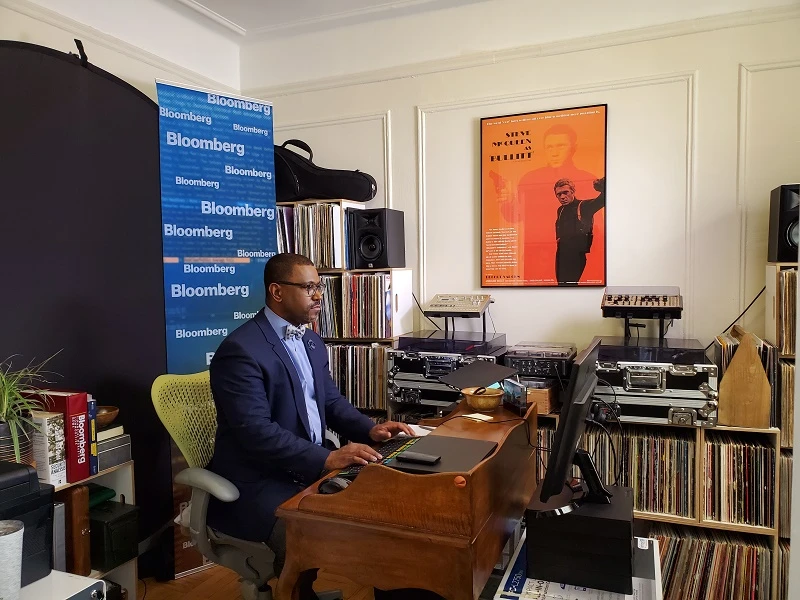Reporting the news in unprecedented times
May 12, 2020


In this time of uncertainty, the way we see the world has changed drastically – as have our news coverage and journalistic perspective. Bloomberg News employees are no strangers to times of upheaval, having covered events ranging from the Arab Spring to the Financial Crisis of 2008, but working in the midst of a pandemic has certainly created some unique challenges.
During a recent internal conversation introduced by Senior Executive Editor Laura Zelenko, a number of Bloomberg News reporters spoke candidly with Senior Healthcare Reporter Cynthia Koons about how journalists are coping with isolation and stress of living through a pandemic, big changes in working routines, and how they’re breaking stories in an unprecedented environment.
“I’ve covered crises and extreme situations in the past, but this one is very different. In my case, I’m not on the front lines, as far as being in a hospital or similar environment, but the stress is still there and the same rules apply as for covering any other crisis. I’d recommend that people be extra mindful of sources right now. We’re business journalists, used to talking to CEOs and people who speak with the media all the time, but, in a crisis, that can change. You may be speaking with someone who’s never talked to a journalist before and is currently dealing with something traumatic. We all need to keep that in mind, treating sources as humanely as possible.”
Laura Millan, Madrid
“Even though I was reporting from Beijing and not physically in Wuhan, I was able to speak with a contact and report on the first doctor to die of the disease, which was particularly important because of all the rumors and misinformation circling in local and international media about it. That actually really helped my mindset, knowing that, even if I wasn’t in the city, I could still do something to help bring visibility and truth to the situation.”
Penny Peng, Beijing
“When we talk to people every day, whether it’s market strategists or economists, so many of them are flying blind as well. A lot of the models that the financial world relies on are pretty useless in this kind of pandemic. The economic issues are much more tied to the health crisis: elements like testing and vaccines. A lot of it is guesswork, despite the fact that these are intelligent and educated guesses.
During the crisis in 2008, it was a lot easier to read the tea leaves. It’s much more challenging now. So, when we talk to people, we try to look at this long term, build the narrative, and gauge what an eventual recovery might look like.”
Romaine Bostick, New York
“Living in Queens, which has been the hardest hit borough within New York City, has been a little surreal. I’ve found that throwing myself into work has been very helpful, but with two small children, that can be a challenge. I think all parents in this scenario need to give themselves a little grace: you’re doing your best in a difficult time. Try to have structure, but look to achieve balance, too. It’s not going to be perfect. You have to be flexible.”
Claire Obusan, New York
“Things have been very uncertain in Hong Kong for quite a while, starting with the protests and now the virus. There are two ways I’ve been coping with the prolonged uncertainty. The first is personal: creating a sort of “sanity schedule” for myself, being sure I could take walks outside and get fresh air every day. The second is staying in touch with community. That could be setting up weekly calls with family and friends who are dealing with the same thing, so you can all process it together. It’s also been important for me to use the money I would have spent traveling and donate to food banks and other charities that need help right now.”
Kristine Servando, Hong Kong
“Obviously, this is an unprecedented situation, and I’m hopeful that we will come back stronger and as soon as possible. In the meantime, I’m doing my best to remain focused and keep my mind clear. I’m a reporter – I need to focus on my work, report what I see, write good stories. On the personal side, I need to keep my family safe and be here for them, staying positive.”
Daniele Lepido, Milan
Key takeaways
- Reporting the news and informing the public is an essential and critically important task. Take comfort in that and stay focused on the power of good, responsible journalism in this environment.
- Treat sources as humans – they’re going through this, too.
- Focus on what you can realistically do and the impact of your own work in the midst of larger uncertainty.
- Look at the big picture. This is unprecedented for everyone, and we need to take developments one day at a time.
- Be kind to yourself and flexible with your responsibilities. It’s not going to be perfect. We’re all doing our best.
- Do what will keep you centered and sane, and build those things into your daily schedule as much as possible. And help others where and when you can.
We’re hiring! Browse open opportunities in News